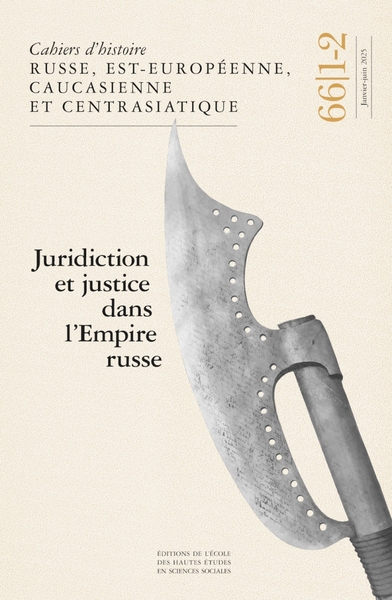
Cahiers d’histoire russe, est-européenne, caucasienne-66/1-2
Auteur(s) COLLECTIF (A01)
Editeur(s) EHESS
Collection(s) CAHIERS DU MONDE RUSSE
Ean :
9782713234163
Date de parution :
25/04/2025
Résumé : Faut-il punir de mort les criminels ? La torture est-elle un moyen légitime de mener l’enquête ? Quels sont les critères de responsabilité pénale ? Les mêmes lois valent-elles pour tout le monde ? De quelles qualités le magistrat doit-il faire preuve ? Comment lutter contre la corruption du personnel judiciaire ? Comment protéger l’indépendance de la justice face au pouvoir politique ? Ces questions, qui nous sont familières, faisaient déjà l’objet de débats dans les milieux gouvernants de l’empire de Russie. Les discussions et même les réformes législatives parfois assez révolutionnaires qui en ont résulté, comme le moratoire sur la peine de mort, l’interdiction de la torture pour les mineurs ou le principe d’irresponsabilité légale des malades mentaux, tous introduits au cours du xviiie siècle, ont été largement oubliées par les générations suivantes. Neuf chercheurs chevronnés reconstituent ici l’histoire de ces débats, de ces réformes et des pratiques judiciaires qui les avaient suscités. Le passé et le présent entrent en résonance sous la lumière froide de l’analyse historique.
Should criminals be punished by death? Is torture a legitimate means of investigation? What are the criteria for criminal responsibility? Do the same laws apply to everyone? What qualities should magistrates possess? How can corruption among judicial staff be combated? How can we protect the independence of the judiciary from political power? These questions, with which we are all familiar, were already the subject of debate in the governing circles of the Russian Empire. The discussions and even the sometimes quite revolutionary legislative reforms that resulted, such as the moratorium on the death penalty, the ban on torture for minors or the principle of legal irresponsibility for the mentally ill, all introduced during the eighteenth-century, have been largely forgotten by later generations. Nine distinguished scholars reconstruct the history of these debates, reforms and the judicial practices that gave rise to them. Past and present both resonate with each other in the cold light of historical analysis.
Should criminals be punished by death? Is torture a legitimate means of investigation? What are the criteria for criminal responsibility? Do the same laws apply to everyone? What qualities should magistrates possess? How can corruption among judicial staff be combated? How can we protect the independence of the judiciary from political power? These questions, with which we are all familiar, were already the subject of debate in the governing circles of the Russian Empire. The discussions and even the sometimes quite revolutionary legislative reforms that resulted, such as the moratorium on the death penalty, the ban on torture for minors or the principle of legal irresponsibility for the mentally ill, all introduced during the eighteenth-century, have been largely forgotten by later generations. Nine distinguished scholars reconstruct the history of these debates, reforms and the judicial practices that gave rise to them. Past and present both resonate with each other in the cold light of historical analysis.
Disponible, expédié sous 2 à 6 jours
35.00 €
